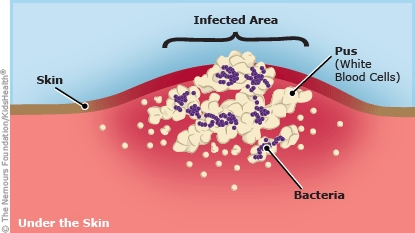Abscess
Article Translations: (Spanish)
What Is an Abscess?
An abscess is the body's way of trying to heal from an infection. Abscesses form after bacteria, fungi, or other germs enter the body — usually through an open wound like a cut — and cause an infection.
When this happens, the body's immune system is activated and sends out white blood cells to fight the infection. It's these white blood cells, along with other debris, that can collect in the wound and make pus. When pus collects and can't drain out, the area forms a painful abscess.
What Are the Signs & Symptoms of Abscesses?
Abscesses usually are red, swollen, and warm to the touch, and might leak fluid. They can develop on top of the skin, under the skin, in a tooth, or even deep inside the body. On top of the skin, an abscess might look like an unhealed wound or a pimple; underneath the skin, it may create a swollen bump. The area can be painful and tender.
In the most severe cases, the infection can cause fever and chills.

Who Gets Abscesses?
Kids are more prone to abscesses because they're less likely to clean and care for their cuts and other wounds, putting them at risk for these types of infections.
Foreign objects that get inside a wound, like sand or clothing fibers, also can lead to abscesses, as can irritated hair follicles.
How Are Abscesses Treated?
Most abscesses can be treated at home. Make sure your child avoids touching, pushing, popping, or squeezing the abscess because that can spread the infection or push it deeper inside the body, making things worse.
Prevent the spread of infection by not letting your child share clothes, towels, washcloths, sheets, or anything else that may have touched the abscess.
To help the abscess open up and drain, try applying a warm compress. You can make a compress by wetting a washcloth with warm (not hot) water and placing it over the abscess for several minutes. Do this a few times a day. Always wash your hands well before and after touching the abscess.
If the abscess opens on its own and drains, and the infection seems to clear up in a couple of days, your child should be OK. But if it doesn't heal, make an appointment with your doctor.
When Should I Call the Doctor?
Call your doctor if:
- Your child's abscess doesn't heal with home treatment.
- The abscess becomes more painful, swollen, and red.
- Red streaks develop around the infected area.
- Your child has a fever or chills.
- Your child is suddenly getting sicker or feels more tired.
The doctor will examine the abscess to see if it needs to be drained. If it does, this will be done by making a small cut in the abscess that lets the pus seep out. Medicine is given beforehand to numb the area. Then, gauze might be applied to absorb the fluid in the wound and help the area heal. If your child has this procedure, make sure to follow instructions about the cleaning and bandaging of the wound.
The doctor may prescribe antibiotic liquid or pills to treat the infection. If so, be sure your child takes all the medicine until it's gone — even if he or she starts feeling better.
Call the doctor if the wound doesn't begin to heal after a few days, or if it comes back.
A Note About MRSA
Some skin infections are caused by MRSA bacteria. This germ is difficult to treat because of resistance to certain antibiotics and can be life-threatening. The good news is that MRSA infections are rare. However, your doctor will keep MRSA in mind while treating a skin abscess, especially if it doesn't heal properly.
Can Abscesses Be Prevented?
Good hygiene is the best way to avoid infection. Keep all cuts and wounds clean, dry, and covered with a bandage to protect them from germs.
Teach kids to wash their hands often and well, using soap and water for at least 20 seconds. If soap and water aren't handy, it's OK to use alcohol-based instant hand sanitizers or wipes.
Note: All information is for educational purposes only. For specific medical advice, diagnoses, and treatment, consult your doctor.
© 1995-2024 KidsHealth ® All rights reserved. Images provided by iStock, Getty Images, Corbis, Veer, Science Photo Library, Science Source Images, Shutterstock, and Clipart.com

